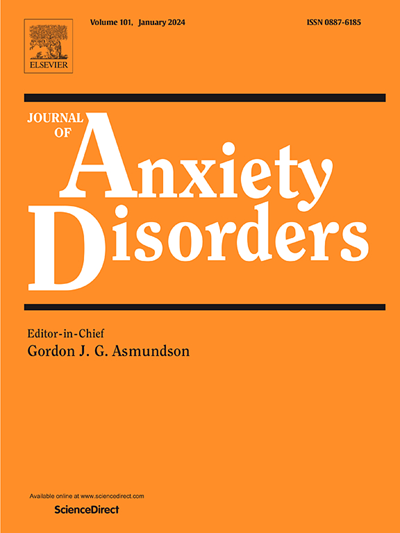强化7天网络认知行为疗法治疗社交焦虑症:一项随机对照试验
IF 4.5
2区 医学
Q1 PSYCHIATRY
引用次数: 0
摘要
这是首个随机对照试验(RCT),旨在检验强化网络CBT (iCBT)治疗社交焦虑症(SAD)的疗效。诊断为SAD的成年人(平均年龄:44.77岁,75.4 %为女性)被随机分配到iCBT组(n = 33)或等候名单对照组(n = 28)。iCBT小组接受了一个临床医生指导的、为期七天的六课在线课程。参与者在治疗后2周和基线后6周(随访1个月)完成了社交焦虑、抑郁症状和功能障碍的自我报告,并在基线和1个月随访时完成了评估SAD和重度抑郁症(MDD)的诊断性访谈。iCBT组报告的社交焦虑症状显著降低(赫奇斯的 >; )。96),工作后和随访1个月的功能障碍(g 's >; )。59),但抑郁症状无显著差异(g 's = .42)。与WLC(96.4 %)相比,iCBT组的参与者在随访时继续满足SAD标准的可能性较小(47.6 %)。依从性(83.9 %完成)和项目满意度(85.2% %报告“大部分”或“非常满意”)很有希望。在强化治疗期间提供iCBT对SAD患者是可行和可接受的,并显示出减少社交焦虑和功能障碍的希望。需要进一步的研究来比较强化iCBT与积极对照组,使用更大、更多样化的样本和更长期的结果。本文章由计算机程序翻译,如有差异,请以英文原文为准。
Intensive 7-day internet-delivered cognitive behavioural therapy for social anxiety disorder: A randomized controlled trial
This is the first randomised controlled trial (RCT) to examine the efficacy of intensive internet-delivered CBT (iCBT) for social anxiety disorder (SAD). Adults (mean age: 44.77 years, 75.4 % female) diagnosed with SAD were randomly allocated to iCBT (n = 33) or a waitlist control group (WLC; n = 28). The iCBT group received a clinician-guided, six lesson program delivered online over seven days. Participants completed self-report measures of social anxiety and depression symptoms, and functional impairment at two- (post-treatment) and six-weeks post-baseline (one-month follow-up), and a diagnostic interview to assess SAD and major depressive disorder (MDD) at baseline and one-month follow-up. The iCBT group reported significantly lower social anxiety symptoms (Hedges’ g’s > .96), and functional impairment at post and one-month follow-up (g’s > .59), but there were no significant differences in depression symptoms (g’s = .42). Participants in the iCBT group were less likely to continue to meet criteria for SAD (47.6 %) at follow-up compared to WLC (96.4 %). Adherence (83.9 % completion) and program satisfaction (85.2 % reported being ‘mostly’ or ‘very satisfied’) were promising. Delivering iCBT over an intensive treatment period is feasible and acceptable to participants with SAD and showed promise for reducing social anxiety and functional impairment. Further research is needed to compare intensive iCBT with active control groups, using a larger and more diverse sample and longer-term outcomes.
求助全文
通过发布文献求助,成功后即可免费获取论文全文。
去求助
来源期刊

Journal of Anxiety Disorders
Multiple-
CiteScore
16.60
自引率
2.90%
发文量
95
期刊介绍:
The Journal of Anxiety Disorders is an interdisciplinary journal that publishes research papers on all aspects of anxiety disorders for individuals of all age groups, including children, adolescents, adults, and the elderly. Manuscripts that focus on disorders previously classified as anxiety disorders such as obsessive-compulsive disorder and posttraumatic stress disorder, as well as the new category of illness anxiety disorder, are also within the scope of the journal. The research areas of focus include traditional, behavioral, cognitive, and biological assessment; diagnosis and classification; psychosocial and psychopharmacological treatment; genetics; epidemiology; and prevention. The journal welcomes theoretical and review articles that significantly contribute to current knowledge in the field. It is abstracted and indexed in various databases such as Elsevier, BIOBASE, PubMed/Medline, PsycINFO, BIOSIS Citation Index, BRS Data, Current Contents - Social & Behavioral Sciences, Pascal Francis, Scopus, and Google Scholar.
 求助内容:
求助内容: 应助结果提醒方式:
应助结果提醒方式:


